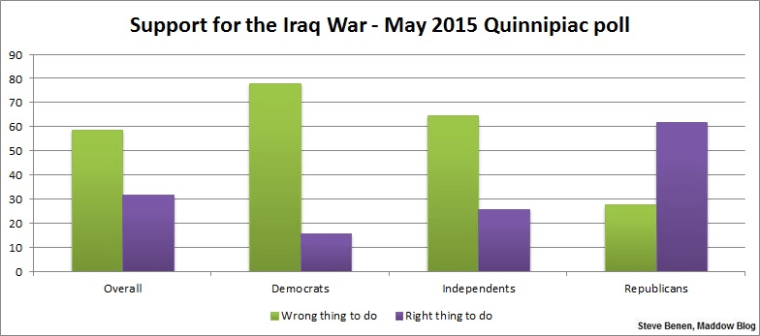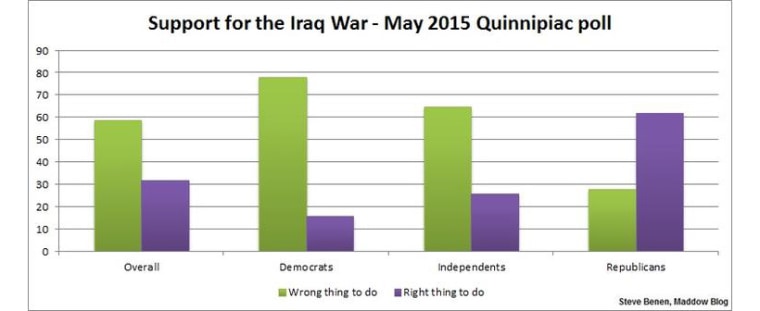
The response wasn't kind. Laura Ingraham, hardly a liberal critic, told her audience, "You can't still think that going into Iraq, now, as a sane human being, was the right thing to do. If you do, there has to be something wrong with you." The Washington Examiner's Byron York, another prominent voice in conservative media, described Jeb Bush's answer as "disastrous."
It took a while, but eventually Bush gave a less ridiculous answer, and nearly everyone in the Republican presidential field answered the same question, but it's worth appreciating why Jeb and others struggled with the question in the first place.
Some of this, to be sure, is the result of a failed Bush legacy that the party has yet to come to terms with. The dominating influence of neoconservatives doesn't help, either. But part of the challenge is that this is the phase of the campaign in which GOP candidates desperately try to convince the Republican Party's base that they're in sync with the party's rank and file. And on this issue in particular, there's a huge gap between Republican voters and the American mainstream. Take this new Quinnipiac poll, for example:
Going to war with Iraq was the wrong thing to do, American voters say 59 - 32 percent. Republicans support the 2003 decision 62 - 28 percent, while opposition is 78 - 16 percent among Democrats and 65 - 26 percent among independent voters.
The wording of the question was unambiguous: "Do you think going to war with Iraq in 2003 was the right thing for the United States to do or the wrong thing?"
Most Americans answered one way; most Republicans answered another.
Look at the above chart to appreciate just how out of step GOP voters are. To use Laura Ingraham's phrasing, it's as if there's simply "something wrong with" the attitudes of Republican voters.
But it's the Republican candidates that have to deal with the consequences. Conservative voters, for reasons that don't seem to make any sense at all, may realize Iraq had no WMD; the war caused thousands of American casualties; the conflict cost hundreds of thousands of dollars; the fiasco destabilized the entire region; and we're still trying to build back American stature and credibility on the global stage, but this doesn't persuade them.
They're still convinced: the war was the right thing to do.
GOP candidates can either agree with their party's base, and appear stark raving mad in the eyes of the broader population, or they can ignore the base, and risk some rival candidate cultivating deeper ties with party activists.
